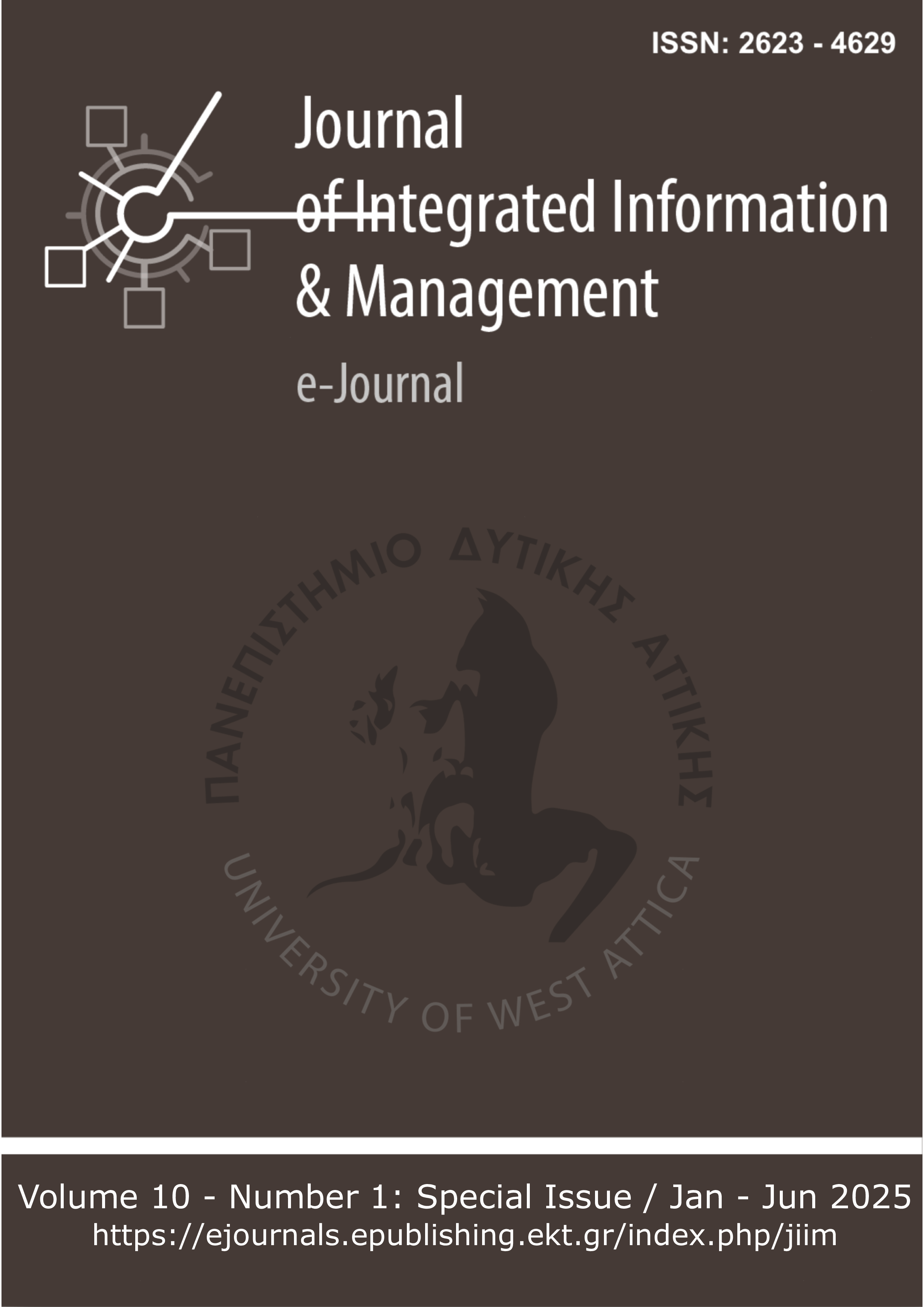Editorial
Abstract
Dear Colleagues,
JIIM is an international, multidisciplinary, blind, peer-reviewed electronic open-access journal that publishes research efforts on all aspects and issues regarding Information Science and Integrated Information Management. JIIM is the official journal of the Department of Archival, Library & Information Studies, University of West Attica (UNIWA), and it is available through the Greek National Documentation Centre (EKT) ePublishing platform for electronic journals: https://ejournals.epublishing.ekt.gr/index.php/jiim.
The current special issue entitled "Records and Archives. Certainties and Doubts in a Hybrid World" hosts seven research articles that offer a comprehensive examination about current developments in archival science, theoretical, methodological, and practical, archival acquisition, appraisal, description, documentation, and management to developing physical, digital, or hybrid collections, organizational or personal, social, legal or cultural archives.
The BioState project, a digital reconstruction of the careers of public officials in 19th-century Greece, is introduced by Chrysanthopoulos et al. in the opening of the special issue. Specifically, the implementation of a semantic relational database for archival documentation is presented, which expands the prosopographical database by reconstructing relevant administrative archives. The applied model enhances the “digital afterlife” of bureaucratic documentation by connecting it with historical persons and facts.
The Europeana historical archives setting is introduced by Christos Papaioannou. The digitization practices and the operational structure of this project are discussed, with emphasis on metadata heterogeneity, access restrictions, and authentication issues. The digitization and online delivery of European historical archives present unique opportunities for historical research, offering diverse narratives and the inclusion of marginalized communities.
Myrto Stamatopoulou presents an intriguing type of photographic archives, the post-mortem ones. In Greece, these photographs may be rare, but they can be found in museums and private collections, offering valuable insights into societal attitudes toward death, loss, grief, and reconciliation with ideals of beauty and eternity. Photos of family members, fellow citizens, prominent individuals, politicians, and even ecclesiastical figures have been preserved, creating archives valuable for historical research.
The intersection of archives and reading promotion, focusing on 20th-century Athens as seen by students of the Department of Archival, Library, and Information Studies, is discussed by Michailidis et al. Group discussions and open-ended questionnaires captured the responses and student perspectives. Reading historical literature alongside archival materials from the same era offers a deeper understanding of each period, including attitudes, behavioral patterns, and culture.
Blockchain technology sparked the revolution of cryptocurrency, but the decentralized ledgers, permanent storage of information in a secure and verifiable way within blocks of transactions, and key encryption together represent a system capable of storing any type of information, including archives. Still, when the blockchain was introduced, European Union authorities designed the General Data Protection Regulation (GDPR) without considering blockchain as an option for archive storage. Kareklas and Chaleplioglou discuss the incompatibilities between them and possible solutions.
Hospital archives represent a unique type of collection that highlights the importance of the host organization. The historical hospital archives reveal not only medical practices from the past but also cultural heritage information. Eginitio Hospital, a nursing institution specializing in neurology and psychiatry with over a century of continuous operation and significant social impact, maintains an impressive historical archive. Penelope Katsigianni discusses the digitization of the Eginitio Hospital historical patient archive from 1904 to 1955.
The current management of medical records through the application of disruptive computational technologies is discussed by Chaleplioglou and Tsolakidis. A comprehensive bibliographic search was conducted, yielding over 9,500 publications on the computational technologies employed in routine electronic medical records management, ranging from machine learning and natural language processing systems to computational medical image analysis, recurrent neural networks, and generative artificial intelligence, reflecting the latest trends in archival management.
Special Ιssue Editors
Professor Georgios Giannakopoulos, University of West Attica
Associate Professor Emmanuel Drakakis, Ionian University
Article Details
- How to Cite
-
Giannakopoulos, G., & Drakakis, E. (2025). Editorial. Journal of Integrated Information Management, 10(1). Retrieved from https://ejournals.epublishing.ekt.gr/index.php/jiim/article/view/42167
- Section
- Editorial

This work is licensed under a Creative Commons Attribution-NonCommercial 4.0 International License.
Copyright Notice
Authors who publish with JIIM agree to the following terms:
- Authors retain copyright and grant the journal right of first publication with the work simultaneously licensed under a Creative Commons Attribution Non-Commercial License that allows others to share the work with:
- An acknowledgment of the work's authorship and initial publication in this journal.
- Authors are permitted and encouraged to post their work online (preferably in institutional repositories or on their website) prior to and during the submission process, as it can lead to productive exchanges, as well as earlier and greater citation of published work.






